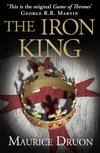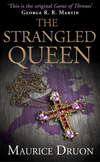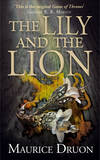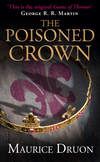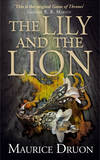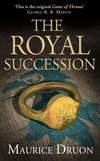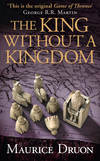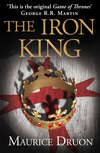Kitabı oku: «The Iron King», sayfa 2
The French lady-in-waiting returned, bringing a purse of interwoven gold thread, lined with silk and fastened with three precious stones as large as thumbnails.
‘Splendid!’ Artois cried. ‘This is exactly what we want. A little heavy for a woman to wear; but exactly what a young man at Court dreams of fastening to his belt in order to show off.’
‘You’ll order two similar purses from the merchant Albizzi,’ said Isabella to her lady-in-waiting, ‘and tell him to make them at once.’
Then, when the Frenchwoman had gone out, she added for Robert’s ear, ‘You’ll be able to take them back to France with you.’
‘No one will know that they passed through my hands,’ he said.
There was a noise outside, shouts and laughter. Robert of Artois went over to the window. In the courtyard a company of masons were hoisting to the summit of an arch an ornamental stone engraved in relief with the lions of England. Some were hauling on pulley-ropes; others, perched on a scaffolding, were making ready to seize hold of the block of stone, and the whole business seemed to be carried out amid extraordinary good humour.
‘Well!’ said Robert of Artois. ‘It appears that King Edward still likes masonry.’
Among the workmen he had just recognised Edward II, Isabella’s husband, a good-looking man of thirty, with curly hair, wide shoulders and strong thighs. His velvet clothes were dusty with plaster.3
‘They’ve been rebuilding Westminster for more than fifteen years!’ said Isabella angrily. (She pronounced it Vestmoustiers, in the French manner.) ‘For the whole six years I’ve been married I’ve lived among trowels and mortar. They’re always pulling down what they built the month before. It’s not masonry he likes, it’s his masons! Do you imagine they even bother to say “Sire” to him? They call him Edward, and laugh at him, and he loves it. Just look at him.’
In the courtyard, Edward II was giving orders, leaning on a young workman, his arm round the boy’s neck. About him was an air of suspect familiarity. The lions of England had been lowered back to earth, doubtless because it was thought that their proposed site was unsuitable.
‘I thought,’ Isabella went on, ‘that I had known the worst with Sir Piers Gaveston. That insolent, boastful Béarnais ruled my husband so successfully that he ruled the country too. Edward gave him all the jewels in my marriage casket. In one way or another it seems to be a family custom for the women’s jewels to end up on men!’
Having beside her a relation and a friend, Isabella at last allowed herself to express her sorrows and humiliations. The morals of Edward II were known throughout Europe.
‘A year or so ago the barons and I succeeded in bringing Gaveston down; his head was cut off, and now his body lies rotting in the ground at Oxford,’ the young Queen said with satisfaction.
Robert of Artois did not appear surprised to hear these cruel words uttered by a beautiful woman. It must be admitted that such things were the common coin of the period. Kingdoms were often handed over to adolescents, whose absolute power fascinated them as might a game. Hardly grown out of the age in which it is fun to tear the wings from flies, they might now amuse themselves by tearing the heads from men. Too young to fear or even imagine death, they would not hesitate to distribute it around them.
Isabella had ascended the throne at sixteen; she had come a long way in six years.
‘Well! I’ve reached the point, Cousin, when I regret Gaveston,’ she went on. ‘Since then, as if to avenge himself upon me, Edward brings the lowest and most infamous men to the palace. He visits the low dens of the Port of London, sits with tramps, wrestles with lightermen, races against grooms. Fine tournaments, these, for our delectation! He has no care who runs the kingdom, provided his pleasures are organised and shared. At the moment it’s the Barons Despenser; the father’s worth no more than the son, who serves my husband for a wife. As for myself, Edward no longer approaches me, and if by chance he does, I am so ashamed that I remain cold to his advances.’
She lowered her head.
‘If her husband does not love her, a queen is the most miserable of the subjects of a kingdom. It is enough that she should have assured the succession; after that her life is of no account. What baron’s wife, what merchant’s or serf’s would tolerate what I have to bear … because I am Queen? The least washerwoman in the kingdom has greater rights than I: she can come and ask my protection.’
Robert of Artois knew – as indeed who did not? – that Isabella’s marriage was unhappy; but he had had no idea of the seriousness of the situation, nor how profoundly she was affected by it.
‘Cousin, sweet Cousin, I will protect you!’ he said warmly.
She sadly shrugged her shoulders as if to say: ‘What can you do for me?’ They were face to face. He put out his hands and took her by the elbows as gently as he could, murmuring at the same time, ‘Isabella …’
She placed her hands on the giant’s arms and said, ‘Robert …’
They gazed at each other with an emotional disturbance they had not foreseen. Artois had the impression that Isabella was making him some mute appeal. He suddenly found that he was curiously moved, oppressed, a prey to a force he feared to use ill.
Seen close to, Isabella’s blue eyes, under the fair arches of her eyebrows, were more beautiful still, her cheeks of a yet softer bloom. Her mouth was half open and the tips of her white teeth showed between her lips.
Artois suddenly longed to devote his days, his life, his body and soul to that mouth, to those eyes, to this delicate Queen who, at this moment, became once more the young girl which indeed she still was; quite simply, he desired her with a sort of robust immediacy he did not know how to express. In the ordinary way his tastes were not for women of rank and his nature was unsuited to the graces of gallantry.
‘Why have I confided all this to you?’ said Isabella.
They were still looking into each other’s eyes.
‘What a king disdains, because he is unable to recognise its perfection,’ said Robert, ‘many other men would thank heaven for upon their bended knees. Can it be true that at your age, fresh and beautiful as you are, you are deprived of natural joys? Can it be true that your lips are never kissed? That your arms … your body … Oh! take a man, Isabella, and let that man be me.’
Certainly he said what he wanted to say roughly enough. His eloquence bore little resemblance to the poems of Duke William of Aquitaine. But Isabella hardly heard him. He dominated her, crushed her with his mere size; he smelt of the forest, of leather, of horses and armour; he had neither the voice nor the appearance of a seducer, yet she was charmed. He was a man, a real man, a rugged and violent male, who breathed deep. Isabella felt her will-power dissolve, and had but one desire: to rest her head upon that leathern breast and abandon herself to him … slake her great thirst … She was trembling a little.
Suddenly she broke away from him.
‘No, Robert,’ she cried, ‘I am not going to do that for which I so much blame my sisters-in-law. I cannot, I must not. But when I think of what I am denying myself, what I am giving up, then I know how lucky they are to have husbands who love them. Oh, no! They must be punished, properly punished!’
In default of allowing herself to sin, her thoughts were obstinately bent upon the sinners. She sat down once more in the great oak chair. Robert came and stood by her.
‘No, Robert,’ she said again, spreading out her hands. ‘Don’t take advantage of my weakness; you will anger me.’
Extreme beauty inspires as much respect as majesty, and the giant obeyed.
But what had happened would never be effaced from their memories. For an instant the barriers between them had been lowered. They found it difficult not to gaze into each other’s eyes. ‘So I can be loved after all,’ thought Isabella, and she was almost grateful to the man who had given her this certainty.
‘Is that all you have to tell me, Cousin? Have you brought me no other news?’ she said, trying hard to regain control of herself.
Robert of Artois, who was wondering whether he was right not to pursue his advantage, took some time to answer.
He breathed deeply and his thoughts seemed to return from a long way off.
‘Yes, Madam,’ he said, ‘I have also a message from your uncle Valois.’
There was now a new link between them, and each word that they uttered seemed to have strange reverberations.
‘The dignitaries of the Temple are soon to come up for judgment,’ went on Artois, ‘and there is a fear that your godfather, the Grand Master Jacques de Molay, will be condemned to death. Your uncle Valois asks you to write to the King to ask his clemency.’
Isabella did not reply. Once more her chin was resting in the palm of her hand.
‘How like him you are, when you sit like that!’ said Artois.
‘Like whom?’
‘King Philip, your father.’
‘What the King, my father, decides, is rightly decided,’ Isabella replied slowly. ‘I can intervene upon matters that touch the family honour; I have nothing to do with the government of the Kingdom of France.’
‘Jacques de Molay is an old man. He was noble and great. If he committed faults, he has sufficiently expiated them. Remember that he held you at the baptismal font. Believe me, a great wrong is about to be done, and we owe it once more to Nogaret and Marigny! In attacking the Templars, these men, risen from nothing, are attacking the great barons and the Chivalry of France.’
The Queen was perplexed; the whole business was beyond her.
‘I cannot judge,’ she said, ‘I cannot judge.’
‘You know I owe a great debt to your uncle Valois, and he would be very grateful if I could get a letter from you. Moreover, compassion never ill-becomes a queen; it’s a feminine trait for which you can but be praised. There are some who reproach you with hardness of heart: this will be your answer to them. Do it for yourself, Isabella, and do it for me.’
He said ‘Isabella’ in the same tone of voice that he had used earlier by the window.
She smiled at him.
‘You’re clever, Robert, beneath your boorish air. All right, I’ll write the letter you want and you can take everything away together. I’ll try to get the King of England to write to the King of France, too. When are you leaving?’
‘When you command me, Cousin.’
‘The purses will be ready tomorrow, I think; it’s very soon.’
There was regret in the Queen’s voice. He gazed into her eyes and she was troubled once more.
‘I’ll await a messenger from you to know when I must leave for France. Good-bye, Cousin. We shall meet again at supper.’
He took his leave and, when he had gone out, the room seemed to the Queen to have become strangely quiet, like a valley after a storm. Isabella closed her eyes and for a long moment remained still.
‘He is a man who has grown wicked because he has been wronged,’ she thought. ‘But, if one loves him, he must be capable of love.’
Those called upon to play a decisive part in the history of nations are more often than not unaware of the destinies they embody. These two people who had had this long interview upon a March afternoon of 1314, in the Palace of Westminster, could not know that, as a result of their actions, they would, almost alone, become the artisans of a war between the kingdoms of France and England which would last more than a hundred years.
2
The Prisoners in the Temple

THE WALL WAS COVERED with a damp mould. A smoky, yellow light began to filter down into the vaulted, underground room.
The prisoner was dozing, his arms crossed beneath his beard. Suddenly he shivered and sat up, haggard, his heart beating. For a moment he remained still, gazing at the morning mist which was blowing in through the little window. He was listening. Quite distinctly, though the sound was necessarily somewhat softened by the thickness of the walls, he could hear the pealing of the bells of Paris announcing the first Mass: the bells of Saint-Martin, of Saint-Merry, of Saint-Germain-l’Auxerrois, of Saint-Eustache and of Notre-Dame; the country bells of the nearby villages of La Courtille, of Clignancourt and of Mont-Martre.
The prisoner heard no particularly arresting sound. It was distress alone that made him start awake, the distress he suffered at each awakening, as he suffered nightmares whenever he slept.
He pulled a big wooden bowl of water to him and drank largely to allay the fever from which he had now suffered for days and days. Having drunk, he allowed the water in the bowl to subside into stillness and leaned over it as if it were a mirror or the depths of a well. The reflection he saw, though shadowy and indistinct, was that of a centenarian. He remained thus for some moments, searching for some likeness to his old appearance in the floating face with its ancestral beard, the lips sunken in a toothless mouth, the long, thin nose, the shadowed, deep-set eyes.
He put the bowl on one side, got up, then took a few steps till he felt the tautening of the chain that bound him to the wall. Suddenly, he began to scream: ‘Jacques de Molay! Jacques de Molay! I am Jacques de Molay!’
There was no answer; he knew there was no one to answer him, not even an echo.
But he needed to scream his own name, to hurl it at the stone columns, at the vaults, at the oak door, to prevent his mind dissolving into madness, to remind himself that he was sixty-two years old, that he had commanded armies, governed provinces, that he had possessed power equal to sovereigns, and that as long as he still drew breath he would continue to be, even in this dungeon, the Grand Master of the Order of Knights Templar.
From a refinement of cruelty, or perhaps contempt, he and the principal dignitaries of the Order had been imprisoned in the cellars, now transformed into dungeons, of the great tower of the Hôtel-du-Temple, their own building, their Mother House.
‘To think that it was I who had this tower repaired!’ the Grand Master murmured angrily, hitting the wall with his fist.
The blow made him cry out, it renewed an appalling pain in his hand, whose crushed thumb was no more than a stump of half-healed flesh. But indeed, what part of his body was neither an open sore nor the seat of some internal agony? Since he had suffered the torture of the boot, he had been a victim to bad circulation in the legs and abominable cramps. His legs strapped between boards, he had undergone the sharp anguish of oaken wedges tapped into place by the executioners’ mallets, while Guillaume de Nogaret, Keeper of the Seals of the Kingdom, asked him questions, trying to persuade him to confess. To confess what? He had fainted.
Dirt, damp and lack of food had had their effect upon his torn and lacerated body.
And more recently he had undergone the torture by stretching, the most appalling perhaps of all those to which he had been subjected. A weight of two hundred pounds had been tied to his right foot while he, old as he was, had been hoisted to the ceiling by a rope and pulley. And all the time Guillaume de Nogaret’s sinister voice kept repeating, ‘Confess, Messire, why don’t you confess?’ And since he still obstinately refused, they had hauled him from floor to ceiling more hurriedly, more jerkily. He had felt his limbs becoming disjointed, the articulations parting, his whole body seemed to be bursting, and he had begun to scream that he would confess everything, admit every crime, all the crimes of the world. Yes, the Templars practised sodomy among themselves; yes, to gain entrance to the Order, it was necessary to spit upon the Cross; yes, they worshipped an idol with the head of a cat; yes, they practised magic, and sorcery, and had a cult for the Devil; yes, they embezzled the funds confided to their care; yes, they had fomented a plot against the Pope and the King … And what more besides?
Jacques de Molay wondered how he had managed to survive it all. Doubtless because the tortures had been exactly calculated, never pushed to the point where there was a risk of his dying, and because, too, the constitution of an old knight, trained to arms and war, had greater resistance than he himself could have believed.
He knelt down, his eyes turned towards the beam of light that entered by the little window.
‘Oh, Lord my God,’ he cried, ‘why hast Thou given me greater strength of body than of mind? Was I worthy to command the Order? Thou hast not prevented my falling into cowardice; spare me, Lord God, from falling into folly. I cannot hold out much longer, no, not for much longer.’
He had been in chains for seven years, only leaving his dungeon to be dragged before the commission of inquiry, and to be submitted to all the pressures and threats that the theologians and lawyers could devise.
In the circumstances one might well fear madness. Often the Grand Master lost all sense of time. As a distraction, he had attempted to tame a couple of rats that came every night to eat the remains of his bread. He passed quickly from anger to tears, from crises of religious devotion to a longing for violence, from idiocy to fury.
‘They’ll die of it, they’ll die of it,’ he kept repeating to himself.
Who would? Clement, Guillaume, Philip. … The Pope, the Keeper of the Seals and the King. They would die. Molay did not know how, but it would certainly be amid appalling suffering and in expiation of their crimes. He unceasingly chewed over these three hated names.
Still upon his knees, his beard raised towards the narrow window, the Grand Master murmured, ‘I thank thee, Lord God, for leaving me hatred. It is the sole force that sustains me now.’
He got painfully to his feet and went back to the stone bench which, cemented to the wall, served both for seat and bed.
Who could ever have thought that he would come to this? His mind constantly returned to his youth, to the boy he had been fifty years before, as he came down the slopes of his native Jura in search of adventure.
Like all the younger sons of the nobility of the time, he had dreamed of wearing the long white mantle with the black cross, the uniform of the Order of the Knights Templar. In those days, the mere name of Templar evoked the epic and the exotic, ships with bellying sails scudding towards the Orient, lands where the skies were always blue, charges at the gallop across the desert sands, treasures of Arabia, ransomed prisoners, captured and pillaged cities, fortresses with huge staircases, built beside the sea. It was even said that the Templars had secret ports from which they embarked for unknown continents.4
And Jacques de Molay had achieved his dream; he had marched proudly through distant cities, clothed in the superb mantle whose folds hung down to his golden spurs.
He had risen in the Order’s hierarchy, higher than he had ever dared hope, achieving every dignity in turn, at last to be elected by the brothers to the supreme function of Grand Master of France and Overseas, and to the command of fifteen thousand knights.
And all this had but led to a dungeon, horror and destitution. Surely few people’s lives could show such prodigious success followed by so great a fall.
Jacques de Molay was idly tracing lines with one of the links in his chain upon the damp mould on the wall, lines which reminded him of the plan of some fortress, when he heard heavy footsteps and the noise of arms upon the staircase that led down to his cell.
Once more he was seized with a feeling of pain, but this time it was precise and definite.
The heavy door creaked open and, behind the gaoler, Molay saw four archers dressed in leather tunics and carrying pikes. Their breath spread out in a thin cloud before their faces.
Their chief said, ‘We have come to fetch you, Messire.’
Molay rose silently to his feet.
The gaoler came forward and with cold chisel and heavy blows of a hammer broke the rivet that fastened the chain to the heavy iron anklets. Each weighed four pounds.
He clasped his great, illustrious mantle, now no more than a grey rag, its black cross in tatters at the breast, about his emaciated shoulders.
They left the dungeon. And in that reeling exhausted old man, his feet weighed down with fetters as he mounted the tower’s steps, there could still be seen something of the commander who had recaptured Jerusalem from the Saracens for the last time.
‘Oh, Lord my God,’ he murmured to himself, ‘give me strength, give me a little strength.’ And to help himself find it, he repeated the names of his three enemies: Clement, Guillaume, Philip.
Fog lay thick upon the huge court of the Temple, cloaked the turrets of the enclosing wall, flowed through the crenellations, and obscured the spire of the great church on the right of the tower.
A hundred soldiers were standing at ease, talking quietly among themselves, as they stood round a big, square, uncovered wagon.
From beyond the walls he could hear the murmur of Paris and the occasional neigh of a horse, sounds that moved him with an ineffable sadness.
Messire Alain de Pareilles, Captain of the King’s Archers, the man who attended every execution, who accompanied the condemned to sentence and torture, was walking up and down the centre of the yard, his face impassive, his expression bored. He was forty years old and his steel-coloured hair fell in a short fringe across his square forehead. He wore a coat of mail, had a sword at his side, and carried his helmet in the crook of his arm.
He turned as he heard the Grand Master’s approach, and the latter, seeing him, turned pale, if it were possible for his pallor to increase.
Merely for interrogations there was not, as a rule, so much display; there were neither wagon nor men-at-arms. A few royal agents came to escort the accused, generally at nightfall, by boat across the Seine.
The presence of Alain de Pareilles was alone significant enough.
‘Has judgment been pronounced?’ Molay asked the Captain of the Archers.
‘It has, Messire,’ he replied.
‘And do you know, my son,’ Molay asked after a moment’s hesitation, ‘what that judgment contains.’
‘I do not, Messire. My orders are to conduct you to Notre-Dame to hear it read.’
There was a silence, then Jacques de Molay asked, ‘What day is it?’
‘The Monday after the feast of Saint Gregory.’
This corresponded to the 18th March, the 18th March 1314.5
‘Am I being taken out to die?’ Molay wondered.
The door of the tower opened again, and three other dignitaries appeared in their turn, escorted by guards, the Visitor General, the Preceptor of Normandy and the Commander of Aquitaine.
They had white hair, and white unkempt beards, their deep-sunken eyes blinked in the light, their bodies seemed to float in their ragged mantles; for a moment they stood still, like great night-birds unable to see in the light. Moreover, the Commander of Aquitaine had a white film over his left eye which gave him something of the appearance of an owl. He seemed completely stupefied. The semi-bald Visitor General had horribly swollen hands and feet.
It was Geoffroy de Charnay, the Preceptor of Normandy, who first, though hampered by his irons, rushed up to the Grand Master and embraced him. There was a long friendship between the two men. Indeed, it was Jacques de Molay who had helped Charnay in his career. Ten years younger than himself, he had looked upon Charnay as his successor.
Charnay’s forehead was furrowed by a deep scar, the legacy of an old battle in which a sword-cut had also given him a crooked nose. This rugged man, his face marked by war, leant his forehead against the Grand Master’s shoulder to hide his tears.
‘Have courage, Brother, have courage,’ said the Grand Master, clasping him in his arms. ‘And you, too, my Brothers, have courage,’ he went on, embracing the other dignitaries in turn.
Seeing each other, they were able to judge of their own appearance.
A gaoler came up.
‘You have the right to have your irons removed, Messires,’ he said.
The Grand Master spread wide his arms in a bitter, hopeless gesture.
‘I have not the money,’ he replied.
For each time they left their prison, in order to have their irons removed and replaced, the Templars had to pay a denier out of the dozen they were allowed for their wretched food, the straw in their dungeons and the laundering of their single shirt. Another of Nogaret’s subtle cruelties! They were accused, but not condemned. They had the right to a maintenance allowance. What was the use of twelve deniers, when a small joint of meat cost forty? It meant starving four days in eight, sleeping on the hard stone, rotting in squalor.
The Preceptor of Normandy took the last two deniers from the old leather purse attached to his belt and threw them on the ground, one for his own irons and one for those of the Grand Master.
‘My Brother!’ said Jacques de Molay with a gesture of refusal.
‘For all the use they are likely to be to me now,’ replied Charnay. ‘Accept them, Brother; there is not even merit in the giving.’
As the iron pins were removed, they felt the hammer-blows resounding in their bones. But they felt the blood pounding in their chests more strongly still.
‘This time, we’ve come to the end,’ Molay murmured.
They wondered what kind of death had been reserved for them, whether they would be subjected to ultimate tortures.
‘It is perhaps a good sign that our irons are being removed,’ said the Visitor General, shaking his swollen hands. ‘Perhaps the Pope has decided upon clemency.’
There were still a few broken teeth in the front of his mouth and these made him lisp, while the dungeon had turned his mind childish.
The Grand Master shrugged his shoulders and pointed to the phalanx of a hundred archers.
‘We must prepare to die, Brother,’ he said.
‘Look, look what they have done to me,’ cried the Visitor, pulling up his sleeve to show his swollen arm.
‘We have all been tortured,’ said the Grand Master.
He looked away, as he always did when someone spoke of torture. He had yielded, he had signed false confessions and could not forgive himself.
He looked round upon the huge group of buildings which had been the seat and symbol of their power.
‘For the last time,’ he thought.
For the last time he gazed upon the vast assembly of tower and church, palace and houses, courts and gardens, a fortified town within Paris itself.6
Here it was that for two centuries the Templars had lived, prayed, slept, given judgment, transacted business, and decided upon their expeditions to distant lands. In this very tower the treasure of the Kingdom of France had been deposited, confided to their care and guardianship.
It was here, after the disastrous expeditions of Saint Louis, in which Palestine and Cyprus had been lost, that they had come, bringing with them in their train their esquires, their mules laden with gold, their stud of Arabian horses and their negro slaves.
Jacques de Molay saw in his mind’s eye this return of the vanquished. Even so, it had something of an epic quality.
‘We had become useless, and we did not know it,’ thought the Grand Master. ‘We were always talking of reconquest and new crusades. Perhaps we showed too much arrogance, and enjoyed too many privileges while no longer doing anything to justify them.’
From being the permanent militia of the Christian world, they had become the permanent bankers of Church and King. To have many debtors is to have many enemies.
Oh, the plot had been well conceived! The drama had begun upon the day when Philip the Fair had asked to join the Order that he might become its Grand Master. The Chapter had replied with a curt and definite refusal.
‘Was I wrong?’ Jacques de Molay asked himself for the hundredth time. ‘Was I too jealous of my authority? But no; I could not have acted otherwise; our rule is binding: no sovereign princes in our ranks.’
King Philip had never forgotten the repulse and the insult. He had begun by dissimulating, lavishing favours and kindnesses upon Jacques de Molay. Was not the Grand Master godfather to his daughter, Isabella? Was not the Grand Master the prop and stay of the kingdom?
Yet the royal treasure had been transferred from the Temple to the Louvre. At the same time a low, venomous campaign of obloquy had begun against the Templars. It was said that they speculated in corn and were responsible for famines, that they thought more of increasing their fortune than of capturing the Holy Sepulchre from the heathen. They were accused of blasphemy merely because they spoke the rough language of the camp. ‘To swear like a Templar’ became the current saying. From blasphemy to heresy was but a step. It was said that they practised unnatural vice and that their black slaves were sorcerers.
‘True it is that all our Brothers were not saints and that inaction was bad for many of them.’
Above all, it was said that during the ceremonies of initiation the neophytes were compelled to deny Christ and spit upon the Cross, that they were subjected to obscene practices.
Under the pretext of putting an end to these rumours, Philip had suggested to the Grand Master, for the sake of the honour and interest of the Order, that an inquiry should be opened.
‘And I accepted,’ thought Molay; ‘I was abominably duped and deceived.’
For, upon a certain day in October 1307 … oh, how well Molay remembered that day! ‘Upon its eve, he was still embracing me, and calling me brother, indeed giving me the place of honour at the funeral of his sister-in-law, the Countess of Valois.’
Ücretsiz ön izlemeyi tamamladınız.
